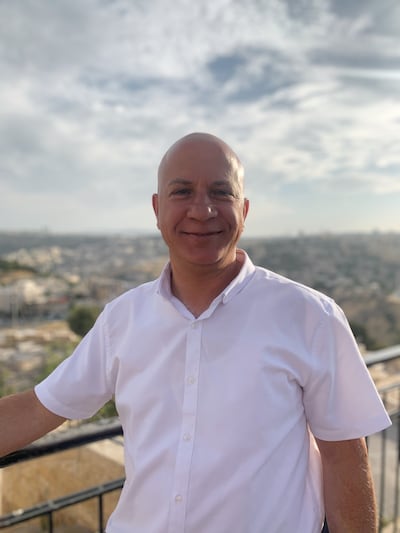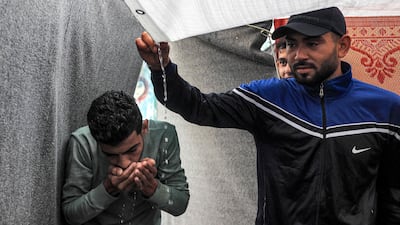Live updates: Follow the latest news on Israel-Gaza
The devastating war in Gaza has set back years of joint work by two environmental NGOs, one Israeli and one Palestinian, which has brought together Palestinians, Jordanians and Israelis to work on clean water technology for Gazans.
Dr Tareq Abu Hamed, executive director of the Arava Institute for Environmental Studies, said that unique technology that can extract water from air was under threat during the massive aerial bombardment in the strip, and fighting between Hamas and Israeli soldiers.
"Issues like climate change, water scarcity, pollution have no borders or checkpoints. We hope we can continue to bring together people from both sides and address these issues jointly," he said.
His group has worked on the unique water project with Palestinian NGO, Damour for Community Development.
Three out of seven Watergen installations in Gaza have survived the Israeli airstrikes and are supplying potable water to the people in the south, Mr Hamed told The National.

“These devices convert humidity in the air into drinking water. These systems are off grid and hence work 24/7 with solar energy,” said Mr Hamed, a Palestinian Israeli who had earlier served as the acting chief scientist of Israel.
“Our Palestinians partners have confirmed that three installations are safe and working,” he said adding the facility could be the only clean drinking water source for the people.
Arava Institute
The three machines are located in Abasan Al Kabira, Abasan Al Jedida and the Nasser medical Centre in Khan Younis, and provide relief to Gazans who have been pushed into the abyss of a humanitarian crisis in the besieged enclave.
Palestinians who fled to south Gaza following warnings from the Israeli army, are grappling with water and power shortages after Israel cut off supply lines into the strip. People have been standing in long lines for clean drinking water, and many have fallen ill after drinking brackish water.
According to the UN, only five per cent of Gaza’s water needs are now being met, and lorries with aid entering the territory from Egypt are hardly enough to meet the needs of the population.
Mr Hamed said three of the installations that survived the airstrikes can jointly produce about 6,000 litres of water a day.
“That could be enough to run a school or a hospital,” he said.

The fate of the other four installations, located in the north of Gaza where intense battle between Israeli forces and Hamas is raging, is not known.
“We don’t know what is their status as it is difficult to contact our Palestinian partners. It is difficult to imagine that the machines have survived the intense airstrikes and bombings," said Mr Hamed.
People grappling with water shortages
The Watergen installations were sent to Gaza as part of a joint project between Arava Institute and local Palestinian NGO, Damour for Community Development, to address the acute water shortage in Gaza.
“Gaza always suffered from water shortages and water quality. Around 97 per cent of underground water in Gaza is polluted and not fit for human consumption. That is caused by several reasons like over pumping, infiltration of sewage to the aquifer,” said Mr Ahmad.
Before the war, Palestinians in the West Bank and Gaza had access to just 80 litres of water per day, falling below the international standard of 100 litres set by the World Health Organisation, according to a report by OCHA (United Nations Office for the Coordination of Humanitarian Affairs).
Since the start of the war, the average consumption of water for all purposes in Gaza has fallen to between two and three litres a day per person. And most of this water isn’t clean or safe to drink.
To address the water shortages in Gaza, the UAE has announced that it will build three desalination plants in Rafah, Gaza Strip, as part of the 'Gallant Knight 3' humanitarian operation.
The Arava Institute brings together and hosts students from Israel, Palestine, Jordan as well as participants from around the world in its campus, carries out research and partly funds environmental projects to promote cross-border cooperation and environmental diplomacy.
Mr Hamed said the Institute is also undertaking several off grid waste water treatment plant projects and desalination projects In Gaza.
“Gaza always suffers from the lack of electricity. That prevents them from treating waste water, which is often pumped into the fields or into the sea. We know that 70 per cent of the beaches in Gaza are polluted with sewage. That is why we do this work to set up off grid water treatment plants to recycle water which is again used for agriculture,” he explained.
The Institute also has similar projects in the West Bank, which are currently halted due to the war, said Mr Hamed.


